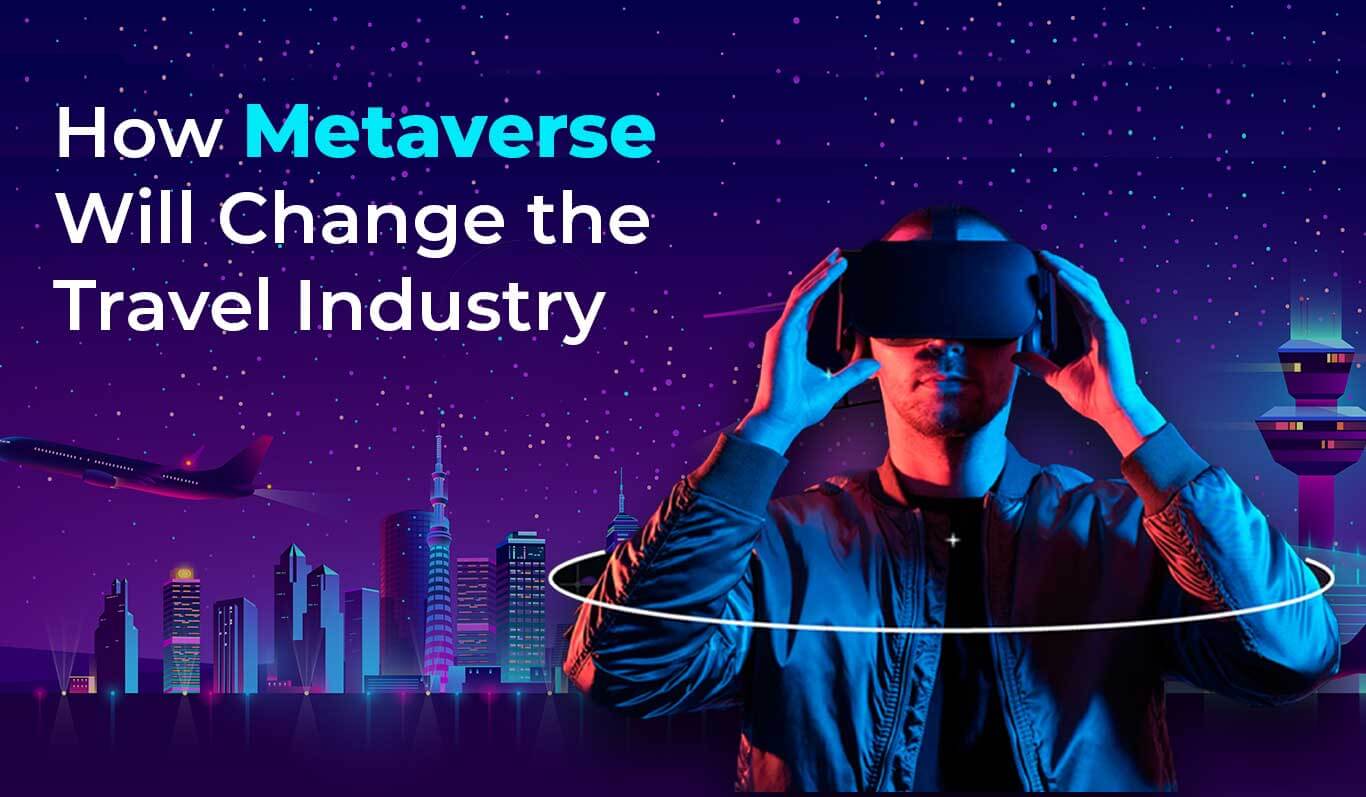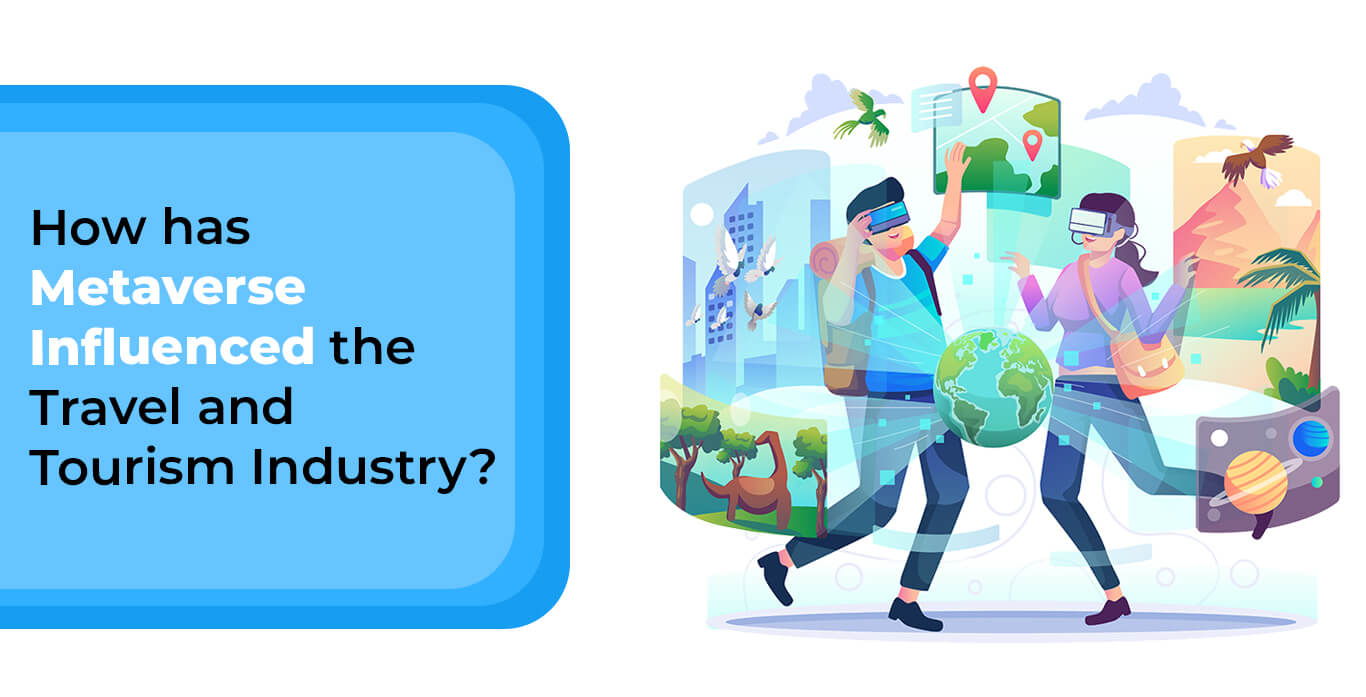How Meta Verse Will Change the Travel Industry

The travel industry has gone through tremendous losses during the pandemic. In recent years travel sectors have seen a significant digital transformation. To give visitors and travelers a better experience. Every travel and tourism company is attempting to integrate certain digital technologies into its operations and procedures.
Metaverse has evolved into various industries like gaming, healthcare, retail, and entertainment media. The experience will be made authentic through the use of AR and VR technologies. All type of businesses and various sectors is being influenced by the metaverse. We have transitioned from 2D to 3D from reality to virtual reality and back again. The pandemic has raised a wide range of interest among people in the virtual tour.
What is Meta Verse?
The blockchain-based shared virtual world known as Metaverse, allows users to engage and explore virtual worlds. It is independent of devices and not owned by any one company. Digital money and NFTs, together with cutting-edge technology like blockchain, virtual reality, and artificial intelligence, are what allow and fuel the decentralized metaverse.
By combining these technologies, users can virtually represent themselves and explore their surroundings. The term "metaverse" has been used by Neil Stephenson originally used it in his 1992 book, Snow Crash. But new developments in technology have shared virtual space more practical than ever.
Facebook rebranded its corporate name to Meta in October 2021 and declared plans to invest at least $10 billion in this idea. The term “meta” has become a very common norm.
How has Metaverse Influenced the Travel and Tourism Industry?

People's perceptions of travel have changed due to COVID's rise and the implementation of travel restrictions. Several individuals are avoiding physical travel and seeking alternatives as a result of many nations banning inbound aircraft, imposing lengthy quarantines, or conducting expensive testing. Even when restrictions were reduced, the possibility of catching COVID and other illnesses has caused many to rethink their physical travel.
The change in perspective has inevitably given rise to new travel trends and rising demand for virtual reality and metaverse travel services. Metaverse travel offers a more secure and affordable option to discover new places for people who want to explore the globe.
How Travel Companies Will Benefit from Metaverse?
Meta + tourism= Meta tourism
Metaverses are becoming trendier in tourism because of their importance in enhancing communication and providing excellent consumer experience.
Encourage tourists to reserve a trip or service -
The idea of metaverse tourism has several advantages, one of which is travelers can get a realistic idea of what to expect from a particular destination. Participating in interactive virtual reality experiences gives a real-world experience.
Metaverse can be used in hotels and transportation, where virtual reality experiences can help potential visitors understand what facilities will be offered or how long the trip would take. Finally, Metaverse can help tourists in making a decision and inspire travel.
Enhance guest booking experiences -
Metaverse Travel & Tourism Solutions can considerably enhance booking procedures. The probability that a customer would finish his or her booking trip rather than cancel it thereby increases.
For instance, hotels can use virtual reality tours or digital avatars to enable customers to walk through a realistic recreation of their facility and get a feel of the size of the room and the amenities offered. Travel companies can give clients lifetime impressions of the place they want them to visit with virtual reality tours.
Increase the booking volume-
Metaverse tourism provides genuine cost to increase total booking volume during the booking process.
Virtual and augmented reality travel technologies provide customers with initial inspiration. The actual hotel, travel, dining, and other service booking experience is more pleasurable and informational it eventually influences long-term purchase decisions.
Examples of the Metaverse in the Travel Sector
Various companies and especially the travel industry is taking advantage of the innovation.
VR tourism: immersive virtual travel
Real-world locations and destinations are already available in virtual 3D representations from certain organizations. Now you can tour the Paris Louvre Museum in virtual reality. Visitors who visit the museum virtually can explore the exhibits, take in performances, or even meet up with friends to have a tour of the space.
People who may not be able to travel physically can still be able to experience the globe through the metaverse, it’s an alternative for actual travel or to get ready for future travel. One way this new technology can help the tourist industry is by providing virtual tours and trips through the Metaverse.
The Use of Augmented reality in Travel
Virtual reality is different from augmented reality. The virtual aspect is simply imposed on the actual surroundings rather than immersing the user in them. A well-known example is the game Pokémon Go, where players may use their phone's camera to view Titanic monsters in the real world.
In the context of Metaverse travel, AR can present information such as restaurant pricing and descriptions, building history, train schedules, connections, and more. This promotes tourists' active participation in their surroundings and offers more purchasing options.
Providing a Platform for Online Trade Shows
The COVID-19 outbreak had a significant influence on trade exhibitions, expos, and associated events which eventually led people to opt for online tourism. People’s growing concern over climate change has also affected the travel and tourism sector. Metaverse travel and tourism technologies can improve these online events by increasing the sense of involvement. Online events can be replicated, but social interactions that are most effective in person can also be imitated through the use of avatars, virtual reality, or other methods.
Virtual Theme Parks and Other Tourist Attractions
Theme Park enthusiasts are increasingly using virtual replicas of their favorite rides and attractions as a result of COVID limitations that restrict travel and even shut down some places. Metaverse enables users to interact with attractions in a completely new way.
The guests can reserve a virtual zoo tour or a "ride" on a roller coaster with no restrictions. When guests might not be able or want to attend in person, virtual attractions might be a new source of income for struggling resorts and theme parks.
Blockchain and the Hospitality Industry
Are you interested in blockchain technology? The way people do online transactions will change as a result of this latest technology. The hotel and tourism companies will benefit significantly from blockchain technology, it makes payments easier and opens up new possibilities for securing tickets and identity.
Blockchain technology produces a permanent record of all transactions, dates, times, with dates and times and other crucial information, acting as a virtual blockchain network.
VR Use in Travel Industry
Virtual reality is already having a significant influence on how consumers choose places, make reservations, and find travel inspiration, from Metaverse travel to fast VR tours. Virtual reality is quickly integrating into many people's daily lives as VR headsets become more widely available as consumer goods.
Virtual reality is gaining attraction in various industries despite having its origins in the game business, particularly tourism.
Conclusion- Let's see what the future holds
Corporations have begun to see the metaverse's potential, but it will take some time for effective takeoff. Forecasts has suggested that the metaverse has the power to alter travel and tourism. Even if this concept has widespread, it is uncertain how people would respond, particularly if visitors wanted to see how the pandemic would have affected people.
Virtual reality allows people who are geographically separated from events or locations to participate in some activities more easily. It also gives users access to tailored experiences that will improve their traveling. By developing immersive brand experiences, businesses can broaden their reach, provide unique experiences, and stay competitive in the digital market.
FAQ’S
1. What is the difference between the metaverse and virtual reality?
Some consumers require assistance on understanding how the Metaverse is different from existing AR/VR industry trends. Virtual reality can be used, but Metaverse it is not necessary in the hospitality and tourism sectors because interactive virtual environment is essential.Games, interactive video, augmented reality, and other related technology can be used to construct and explore interactive virtual worlds.
2. How startup travel companies can start their business with metaverse?
-
Choose the right platform.
-
Boost your internet visibility.
-
Considering target audience.
-
Focus on experience.
-
Learn more about cryptocurrency.
-
Stay flexible
3. Will travel be replaced by the Metaverse?
Virtual travel can partially replace actual travel, already implemented in travel and hospitality industry. The travel sector has suffered since the pandemic. People choose to travel via the Metaverse for a variety of reasons. While it is true that physical travel has its own attractiveness and thrill, metaverse travel is gradually growing popularity.
Request a Quote
Categories
Popular posts
Best Practices for Software Product Engineering Every CTO Should Implement
2023-14-18How to Build Your Own On-Demand Carpooling App Services?
2023-08-25How to Start an On-Demand Fuel Delivery Business: A Comprehensive Guide
2023-07-28Empowering Miners: How Fleet Management Apps are Transforming the Mining Industry?
2023-07-21A Complete Guide to Develop a Food Delivery App for Restaurants in 2023
2023-07-08Mobile Apps Transforming the Travel Industry: A Game-Changer in Travel Planning and Experience
2023-07-07
